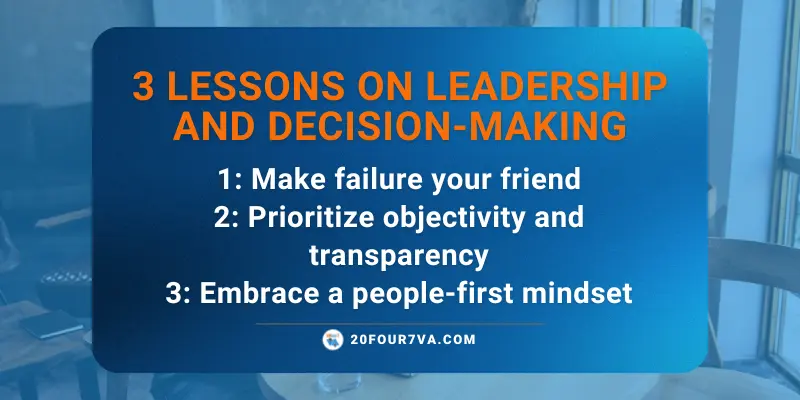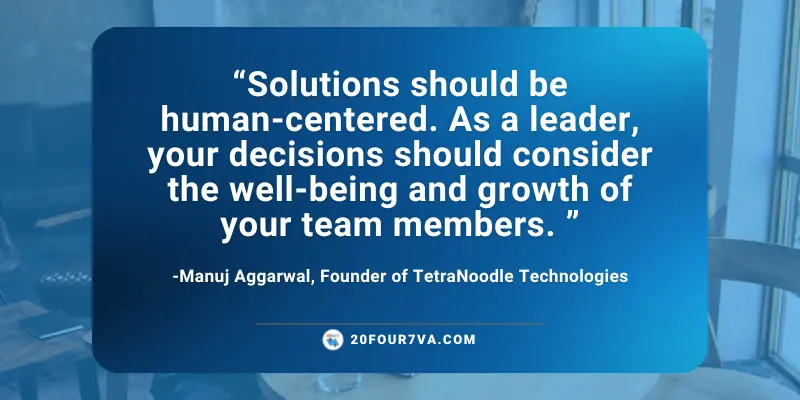How Leaders Make Difficult Decisions: 3 Hard-Won Lessons

The ability to make difficult decisions is an indispensable skill. Leadership decision-making has the power to affect the fate of companies, employees, and stakeholders. All these tend to make the weight of the responsibility immeasurable and the margin for error seemingly razor-thin.
Leaders who are just starting out will inevitably feel overwhelmed by this big responsibility. Knowing that a decision can lead to various outcomes and affect people outside yourself can make for an unbearable environment.
But becoming an able decision-maker is not impossible. In fact, there are leaders across the globe making difficult decisions all the time. To shed light on this critical role of leadership, we turned to those who have navigated these treacherous waters—five seasoned business leaders from various industries.
3 Lessons on Leadership and Decision-making
As a leader, you’re not just in charge of the direction of your business. You’re also responsible for people’s livelihood and well-being. Both make leadership a pressure-filled role, especially when you know that there are many difficult choices out there.
With the right leadership mindset, you can make decisions that you will be proud to stand by. To help you on your leadership journey, here are three hard-won lessons from seasoned business experts:
Lesson 1: Make failure your friend
In an ideal world, everything will go according to Plan A. But any seasoned individual knows that’s simply not the case. Even when you feel like you’ve dotted all your i’s and crossed the t’s, you can’t 100% ensure that the outcome will always be in your favor.
“I have made many decisions that didn’t turn out as expected,” shares Manuj Aggarwal, Founder and Chief Innovation Officer at TetraNoodle Technologies. He further adds, “In fact, I would say that entrepreneurship is a journey of trial and error.” Having this mindset of embracing failure as an opportunity to learn is important. It makes space for improvement and minimizes negative thinking and loss of confidence in one’s decision-making skills.

When asked about whether or not they’ve learned lessons from decisions not going as expected, Triumphant Transition Partners Founder & CEO Nate Thompson’s answer is a resounding yes. He shares, “Plenty. I learned not to count your chickens before they hatch, as they say. It has made me think [of the] big picture more than small.” Full Sail Product Management Consulting CEO Daniel LeSieur also confirms, “I have made quite a few decisions that didn’t turn out as expected. Those decisions have opportunities to turn out better or worse.”
Every leader, like Nate Thompson and Daniel LeSieur, will make decisions that won’t go as expected. But that’s not the takeaway that these two leaders want to share. Both of them saw their experiences of failure as a way to improve their decision-making and leadership skills.
As a leader, you’ll experience different versions of “failure.” These can be in the form of pushback from employees, lower-than-expected results, and more. But the possibility of failure doesn’t mean you should shrink away from your decision-making responsibilities. But at the same time, it also doesn’t mean you should settle for poor results.
The important thing is to acknowledge that failure is a possibility and not see it as a complete loss. If anything, it’s a chance to show yourself and others what you’re made of. Dust yourself off and try again, but the next time, you’ll be more discerning and competent.
Lesson 2: Prioritize objectivity and transparency
One of the challenges of decision-making in leadership is navigating the emotional toll and pressure that comes with the job. When you’re in a team setting, it can be easy to be paralyzed by external and internal pressure. It can also be difficult to feel torn between making the right decision and keeping people happy.
But when it comes to business, you’ll be hard-pressed to find a decision that completely satisfies all parties. The most suitable approach then, according to Brittany McCoy, McCoy Consulting LLC CEO, is to ensure “all decisions should support the mission and goals of the organization.”
Informed and objective decisions, along with transparency, can minimize pushback from other people. McCoy adds that getting too personal can be a liability as “the business, the employees, and the customers always suffer either directly or indirectly.”
When you’re guided by the goals and core values of the organization, making tough decisions becomes less difficult. Instead of acting on pure intuition, which can be easily refuted or questioned, you can turn to more objective references. These include your documented business goals, KPIs, and historical data.
When backed by business intelligence and guided by your own values as well as those of the organization, making tough decisions becomes possible. At the same time, having the right information to back up your decision makes it easier to confidently stand by your decision. You can also use concrete data to explain to the rest of the organization how you’ve arrived at a certain decision.
Lesson 3: Embrace a people-first mindset
Caring for your employees means keeping your customers satisfied. How? Happy and empowered employees provide a better quality of work and customer service. This is why learning to be a human-centered leader is a must. If you want sustainable success, you need to always consider the potential impact of your decisions on the people that help you run your business.
Manuj Aggarwal says being people-centered is crucial, especially in a rapidly developing business landscape. He shares, “As a leader, your decisions should consider the well-being and growth of your team members. A leader’s decisions should positively impact the lives of those they lead.” For him, being human-centered is about making decisions that will help you reach your goals without sacrificing the welfare of your employees.
Understandably, acquiring this leadership skill is not as easy as one might expect. External factors and pressures can cause leaders to prioritize profit over people. In a fast-paced world where it’s a race to become the best, it can be easy to get lost and solely focus on reaching a certain KPI or quota without thinking about how decisions can impact those on whose work your business depends.

For Full Sail Product Management Consulting CEO Daniel LeSieur, empathic leadership did not come easy. He shares, “One of my hardest lessons learned was becoming an ’empathic leader.’ An empathic leader is one who realizes the next conversation with your team, peers, or leaders is just as important as the last. The information they’re willing to share with you is based on trust.”
It took numerous mistakes for him to grasp the importance of empathy. “[Past experiences helped me realize] that becoming more invested in [employees’] requests built trust and empathy. I believe that’s a large part of our success.”
So what makes a great leader?
There’s no way around it. Great leaders make decisions every day. Some decisions are more difficult to make than others.
There’s no magic potion to make mistakes go away. The best you can do is to fully embrace your role and do what you can to become your own definition of a great leader. You must find ways to learn and adapt, making your next decision better than the last.
You must also adopt a forward-thinking mindset. Being empathetic and data-driven shouldn’t be mutually exclusive traits. You can find a balance between reaching your business goals and being human-centered. After all, your employees are the heart of your organization. Taking care of them equates to taking care of your business as well.
Your own journey as a decision-maker
Remember, everyone’s journey is different. You need to be aware of your business’s intricacies and specific needs. At the same time, you must also invest time and energy in learning about the best practices of your competitors as well as the top organizations in other industries. There’s a myriad of resources at your fingertips; use them to your advantage.
Hopefully, these hard-won lessons from other leaders will help you paint a clearer picture of the type of leader you want to be. And in the future, you can impart your own hard-won lessons to the next generation.
Acknowledgments
The 20four7VA team would like to thank the business leaders who took time out of their schedules to impart their hard-won business lessons to us. This article would not be complete without the valuable insights from:
- Nate Thompson, Founder and CEO of Triumphant Transition Partners
- Brittany McCoy, CEO of McCoy Consulting, LLC
- Laura Prendergast, Co-founder of The Visionaries
- Daniel LeSieur, CEO and Principal of Full Sail Product Management Consulting
- Manuj Aggarwal, Founder and Chief Innovation Officer of TetraNoodle Technologies
Enrich your leadership journey with more insights from business experts.











